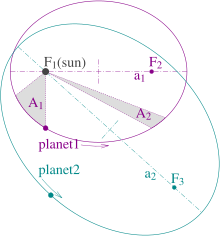What does kepler's law of planetary motion mean?
Definitions for kepler's law of planetary motion
ke·pler's law of plan·e·ta·ry mo·tion
This dictionary definitions page includes all the possible meanings, example usage and translations of the word kepler's law of planetary motion.
Princeton's WordNet
Kepler's law, Kepler's law of planetary motionnoun
(astronomy) one of three empirical laws of planetary motion stated by Johannes Kepler
ChatGPT
kepler's law of planetary motion
Kepler's laws of planetary motion are three scientifically proven laws that describe the motion of planets around the sun. These include: 1) The Law of Orbits: Each planet moves in an elliptical orbit with the sun at one of the two foci. 2) The Law of Areas: A line segment joining a planet and the sun sweeps out equal areas during equal intervals of time, implying that a planet travels faster when it is closer to the sun. 3) The Law of Periods: The square of a planet's orbital period is proportional to the cube of the semi-major axis of its orbit. This means that more distant planets take longer to complete their orbit around the sun. These laws developed by Johannes Kepler in the 17th century are foundational to our understanding of planetary motion and celestial mechanics.
Numerology
Chaldean Numerology
The numerical value of kepler's law of planetary motion in Chaldean Numerology is: 3
Pythagorean Numerology
The numerical value of kepler's law of planetary motion in Pythagorean Numerology is: 8
Translations for kepler's law of planetary motion
From our Multilingual Translation Dictionary
- கெப்லரின் கோள்களின் இயக்க விதிTamil
Get even more translations for kepler's law of planetary motion »
Translation
Find a translation for the kepler's law of planetary motion definition in other languages:
Select another language:
- - Select -
- 简体中文 (Chinese - Simplified)
- 繁體中文 (Chinese - Traditional)
- Español (Spanish)
- Esperanto (Esperanto)
- 日本語 (Japanese)
- Português (Portuguese)
- Deutsch (German)
- العربية (Arabic)
- Français (French)
- Русский (Russian)
- ಕನ್ನಡ (Kannada)
- 한국어 (Korean)
- עברית (Hebrew)
- Gaeilge (Irish)
- Українська (Ukrainian)
- اردو (Urdu)
- Magyar (Hungarian)
- मानक हिन्दी (Hindi)
- Indonesia (Indonesian)
- Italiano (Italian)
- தமிழ் (Tamil)
- Türkçe (Turkish)
- తెలుగు (Telugu)
- ภาษาไทย (Thai)
- Tiếng Việt (Vietnamese)
- Čeština (Czech)
- Polski (Polish)
- Bahasa Indonesia (Indonesian)
- Românește (Romanian)
- Nederlands (Dutch)
- Ελληνικά (Greek)
- Latinum (Latin)
- Svenska (Swedish)
- Dansk (Danish)
- Suomi (Finnish)
- فارسی (Persian)
- ייִדיש (Yiddish)
- հայերեն (Armenian)
- Norsk (Norwegian)
- English (English)
Word of the Day
Would you like us to send you a FREE new word definition delivered to your inbox daily?
Citation
Use the citation below to add this definition to your bibliography:
Style:MLAChicagoAPA
"kepler's law of planetary motion." Definitions.net. STANDS4 LLC, 2024. Web. 24 Apr. 2024. <https://www.definitions.net/definition/kepler%27s+law+of+planetary+motion>.



Discuss these kepler's law of planetary motion definitions with the community:
Report Comment
We're doing our best to make sure our content is useful, accurate and safe.
If by any chance you spot an inappropriate comment while navigating through our website please use this form to let us know, and we'll take care of it shortly.
Attachment
You need to be logged in to favorite.
Log In